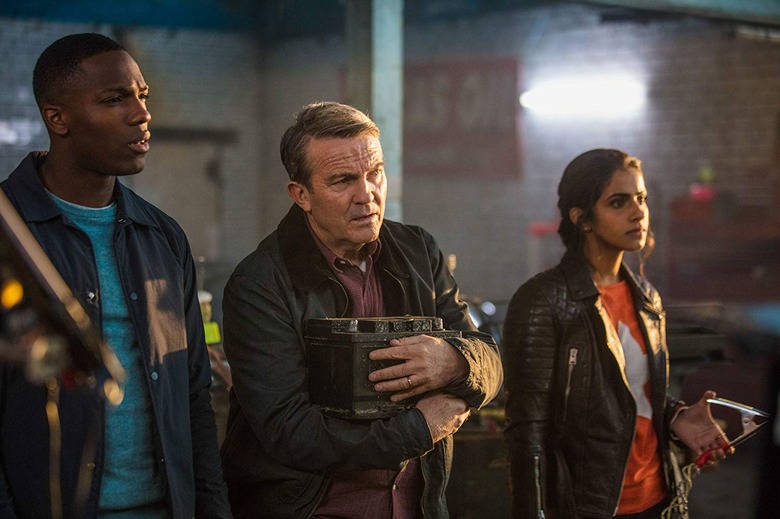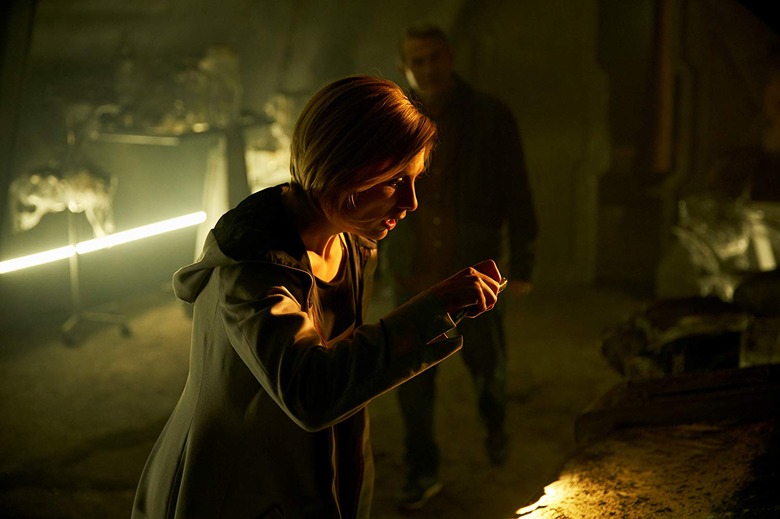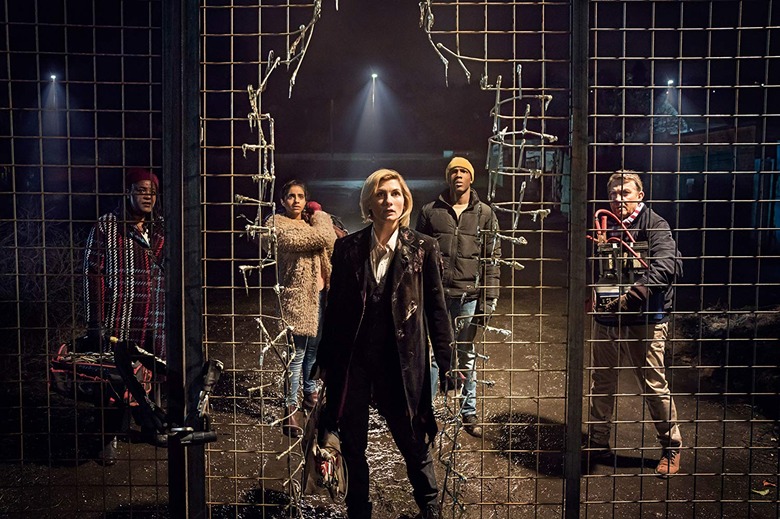'Doctor Who' Review: You'll Fall In Love With Jodie Whittaker's Doctor In "The Woman Who Fell To Earth"
This is the Doctor, and Doctor Who, as we've never seen before. The season 11 premiere of Doctor Who marks a new era for the long-running British sci-fi show — in more ways than one. There's a new showrunner, Chris Chibnall, for the first time in eight years, who brings with him a new, humanist approach to the series along with the most diverse creative team that the show has ever seen.
But I need to once again emphasize how monumental it is that Jodie Whittaker plays the first female Doctor ever. In its 55-year history, the titular time-traveling alien of Doctor Who has been played exclusively by 12 white men. But no more.
Make New Friends
When Jodie Whittaker steps into the TARDIS (in a manner of speaking) as the 13th incarnation of the Doctor in "The Woman Who Fell to Earth," it's not hard to immediately fall for her. Effervescent, buoyant, and bristling with an unpredictable energy, Whittaker's 13th Doctor is both unlike any Doctor we've seen before but more like them than you'd expect. She's got Christopher Eccleston's volatility, David Tennant's bravado, Matt Smith's zaniness, and a little bit of Peter Capaldi's weary cynicism. But what she's got over her darker New Who predecessors is a beaming smile that feels like it could singlehandedly catapult the show back into the bright, escapist territory that it once was known for. But oddly, the Doctor's optimistic makeover doesn't seem to extend to the tone of the first episode.
Maybe because of Chibnall's experience as the head writer for Broadchurch, "The Woman Who Fell to Earth" unfolds a lot like a crime drama — all moody atmosphere and dim lighting. It stands in stark contrast to both the camp-meets-soap Russell T. Davies era and the puzzle-box whimsy of the Steven Moffat era. This dark, tactile approach feels a little antithetical to Doctor Who and Whittaker's depiction, but I'll reserve judgment until I see the full season. But there's no question that Chibnall, who writes the season 11 premiere episode, is bringing Doctor Who back to Earth. We experience the episode's alien invasion through the eyes of our new companions, in particular Ryan Sinclair (Tosin Cole), a warehouse worker with dsyphraxia disorder. We meet Ryan and his close-knit family unit of his grandma (Sharon D. Clarke) and her husband Graham O'Brian (Bradley Walsh) at a field in Sheffield where Ryan is trying and failing to ride a bike. Frustrated with his failings, Ryan throws the bike over a cliff, which leads him to stumble upon an alien object that looks a lot like a giant dreidel.
The episode takes its sweet time introducing us to the human companions — or "friends" as they've been billed this season. But by the time they've all gathered, including Mandip Gill's shrewd aspiring policewoman Yasmin Khan, "The Woman Who Fell to Earth" is ready for the Doctor's flashy entrance. And it delivers. The Doctor doesn't appear until a full 15 minutes into the episodes, but she enters with a bang, literally crashing through the roof of a train and stopping a tentacled electricity alien in its tracks.
Right off the bat, Whittaker is fun, she's engaging, and she forms a comfortable team with Ryan's believer, Graham's skeptic, and Yasmin's adventurer. Clarke's Grace is a delightful part of the team as well, but her exclusion from the marketing materials sadly seals her fate already. Though the Doctor is suffering from a bit of post-regeneration amnesia (which the show has pulled before in its Classic era), it's almost inhuman the speed at which this group works so well together.
Keep (Some of) the Old
The most fascinating part of the episode is that it leaves the Doctor without any of her familiar hallmarks. Without a sonic screwdriver, without a TARDIS, the Doctor feels truly unmoored. So it's up to Whittaker to persuade us that she is the Doctor, and she does it with gusto. Like the episode's tone, the dialogue is quite dark and dramatic, but Jodie delivers it with a bubbly verve, throwing in some physicality that recalls Smith's wacky Doctor. There are a many moments where I smiled and said aloud, "Oh yeah, she's the Doctor" — her "I never go anywhere that's just initials" jab, her shocking bit of physical comedy where she's slammed against a wall and compliments the comfy sofa. But the scene that solidified Whittaker for me was when the Doctor sets out to build her sonic screwdriver out of "Sheffield steel" and alien junk.
"I'm good at building things! Probably!" she happily declares before the episode launches into an adorable montage. It's another scene that recalls Smith's Doctor — specifically his brilliant fish custard scene that also helped establish him as the Doctor to thousands of fans mourning Tennant. Whittaker radiates empathy in every face that she pulls and every smile that she sends at a random spoon. This scene will go down as Whittaker's "hero moment," even more than her equally fantastic "I am the Doctor" speech or her impressive acrobatics when she leaps from a crane to save the alien's latest victim. There's always a bit of discomfort and mistrust whenever a new Doctor arrives on the scene, but with this scene, Whittaker announces that she is here to stay.
Show Me Your Teeth
2018 is proving to be a great year for villains who love pulling out teeth. The monster of the week is a spectacularly creepy one whose name becomes a hilarious recurring joke: Tim Shaw, a Stenza warrior alien who hunts and collects human beings like trophies. The facial prosthetics for Tim Shaw are eerie, with hundreds of human teeth embedded in his face, even as the rest of the design looks a little Power Rangers. On the other hand, the tentacled electrical alien does little more than act as a plot device — though it does manage to look like a much cooler version of a Pokemon. But it bodes well for Doctor Who, which will reportedly feature exclusively all-new aliens this season.
Along with the truly gross design of Tim Shaw, as well as the low lighting and intense close-ups that "The Woman Who Fell to Earth" insists on, the episode manages to induce a state of dread that I haven't felt in a long time with Doctor Who. But it soon swings into an action-packed finale that sees the Doctor leaping from a crane in an Indiana Jones-inspired moment. All these elements — including the Doctor's ultimatum with Tim Shaw that results in her bartering with the lives of her new friends thanks to the DNA bombs implanted in their collarbones — lend to our idea of who Whittaker's Doctor is. Is she a kind guardian who leaps to people's aid? Is she a chess master? A warrior who kills the monster without remorse? This episode hints at all three, or perhaps none at all. To borrow from the Big Bad of the week, the Doctor shows her teeth — but whether they'll be mostly in a grimace or a smile is yet to be seen.
The show is aware of the immense pressure that Whittaker is under as the first female Doctor, and while it plays it safe with her Doctor's in-flux characteristics, it stands strong in her final "I am the Doctor," speech. "We're all capable of the most incredible change," she tells Tim Shaw before offering him an out. "We can evolve while still staying true to who we are. We can honor who we've been and choose who we want to be next."
Though the episode pulls a last-minute twist by revealing that Ryan's vlog about "the greatest woman I ever met" is about his grandma, it feels like a promise to Doctor Who fans as well. "The Woman Who Fell to Earth" is just a sign of great things to come.
Tidbits in Time and Space



